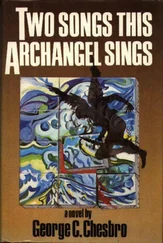Eavesdropping at dinner, pretending to listen to Lucinda and Maud but actually straining to hear Axel’s response to Duncan’s questions, Sam learned that Axel, when he wasn’t resting, passed the hours reading books he’d borrowed from Harold and George. Harold, meanwhile, kept busy with the little daily newspaper he now posted each morning on a bulletin board, around which people gathered to read his notes of the ship’s progress and bits of friendly gossip. The college girls put on a fashion show, herding good-humored volunteers along an improvised runway as others voted for the most outlandish costume. On a day when the sea was very smooth, pierced now and then by leaping fish, Sam wrote letters to his mother and to the woman he was seeing back home, neither of whom knew that his changed plans had put him aboard the Athenia . The letters, which couldn’t be sent until they reached Halifax, were as useless as curled wings on a fly, but time passed as he tried to describe — not the explosions, not the bodies, not his night in the boat. Not what had happened in Edinburgh, nor what Duncan had done, nor his estrangement from Axel. The shapes the clouds made in the sky, then. The porpoises leaping in sets of three and five. The brave little girl in her improvised romper and the kind women, strangers before boarding this ship, who cared for her.
He found a corner where he could wash his face in the morning, and an exercise route — from the open middle deck in front of the smokestack, around the port side of the deckhouse, to the bow, and back down the starboard side — on which, if he rose early enough to beat the crowds, he could pace like a horse in a mine. No matter what he did, or how he arranged his days, he ran into Duncan. When Duncan stopped near the air scoops to light a cigarette, the solid sheet of hair lying over his forehead flapped up and down in the breeze like a lid. Why was he there when Axel, whom Sam so much wanted to see, was always where Sam was not? And when Sam went down below one night to the talent show that Maud and Lucinda had organized, Axel was there, but there with Duncan.
Men sang “Danny Boy” and “Begin the Beguine,” children tap-danced, a woman pleated an accordion. Two sailors whacked at fiddles as two more whirled about. Axel came over to suggest that Sam do some little tricks involving toothpicks and gumdrops, which he was good at and used to offer up at parties: two minutes to make a model of a locomotive, a minute — Avery had first taught him this — for a sugar molecule. Sam was almost tempted, remembering how at Woods Hole he’d entertained his companions with models of sea squirts and the polymer backbone of cellulose, but then he looked at Duncan, right by Axel’s side and waiting for him to make a fool of himself, and he declined.
Instead, Duncan stepped forward and, in his surprisingly sweet tenor voice, sang a bland version of the song for which, years ago, he used to invent ribald verses, entertaining the students during the summer they’d both spent at Woods Hole. Sam had just finished his junior year at college then; Duncan had been in his second year of graduate school, studying with Axel’s teacher, Thomas Morgan. Almost everyone important in their new field was at the biological station that summer, investigating some aspect of genetics or embryology or both. Sam, one of the few undergraduates taking the invertebrate course, paid his tuition by waiting tables at the mess hall and collecting specimens for his teachers. On nights when the moon was in the right phase, he’d bus his tables, drop his apron, and head for the Cayadetta ’s dock with a long-handled net and a tray of finger bowls. His desire to earn his teachers’ approval was as ruthless as the lantern he held over the water, dooming the mating clam worms that spiraled upward.
Afterward, he skipped the gatherings at the ice cream parlor and the visits to the movie house in Falmouth so that he could work on the project that had seized him. A scientist named Paul Kammerer had recently made two American lecture tours; his sensational work— VIENNA BIOLOGIST HAILED AS GREATEST OF THE CENTUR: Proves a Darwin Belief, one newspaper blared — was so interesting, and so controversial, that even Sam’s mother had interviewed him for one of her articles. Kammerer claimed to have shown that when a change in the environment of his toads and salamanders caused an adaptive change in them — altered skin color, different reproductive behaviors — these changes could be transmitted to subsequent generations. A kind of heresy, Sam knew — the exact opposite of what he’d seen in the lab for himself. Although he’d breathed in his Quaker grandparents’ conviction that the world can be improved, first Mr. Spacek and then Axel had trained him out of his unconscious assumptions that when individuals strengthened and developed their faculties, through vigorous use, they then passed that strengthening along. That the ones they stopped using were lost, and lost for good.
At Woods Hole, though, surrounded by interesting strangers pursuing so many different ideas, the truth had begun to seem more complex again, which made him read Kammerer’s claims with real curiosity. Axel had taught him to question everything — didn’t that include the beliefs that were quickly becoming conventions in their field? At night, roasting oysters on the beach, he and his classmates talked about Kammerer and speculated on the reasons why some biologists attacked him so furiously. Even those opposed to his conclusions were disturbed by that. They were all flirting with socialism then, some more than flirting; they sympathized when Kammerer complained that no one gave him a fair hearing. With the Great War just over, no one wanted to hear that inheritance wasn’t everything, or that race and class characteristics passed on through generations might be altered.
Tiny, darkly tanned Ellen Eliasberg, a fellow student in Sam’s invertebrate course, was moved by Kammerer’s passionate statements about the necessity of man passing on what he acquired in the course of his lifetime to his children and his children’s children. Sam was caught up by her arguments — and, at the same time, fascinated by the bad temper Duncan’s advisor showed whenever anyone mentioned Kammerer’s work.
“The leopard can change his spots?” he’d say mockingly. “Fathers can pass what they’ve learned to their sons? Why not just reject every bit of science done in the last century? Why not go right back to Lamarck and his folklore? Cave fishes and deep-sea dwellers lose their eyes because they don’t need them in the dark; moles have poorly developed eyes because they’re in burrows most of the time; if an organ isn’t used, it conveniently disappears, and if it’s used often — why not point to the giraffe stretching his neck to reach for higher leaves? — it gets bigger. How long has that been believed? And yet Payne bred fruit flies in the dark for sixty-nine generations, without the slightest change in their eyes or behavior. In my own lab, we’ve seen well over one hundred new types arise spontaneously, with no environmental influence, each breeding true from the start. Overnight — literally, overnight! — eyeless flies have appeared from normal parents, by an obvious change in a single hereditary factor.”
Then he’d say that the popular press was being fooled, once again, and foolishly misleading the public (here Sam thought of his mother; had she sorted this out?); he’d say Kammerer was a charlatan and a publicity seeker and perhaps even a fraud. He ranted so wildly that even Duncan looked uneasy, and Sam saw, for the first time, what might happen when the passion required to defend a new set of ideas went too far.
But he wanted to work, simply to work, and he tried to stay focused on that. The old wooden house where he bunked that summer was less than a block from the lab, surrounded by sand and scrubby pines, but during his first weeks he went there only to sleep. Every minute he could steal from his course and his jobs he spent designing an experiment that might prove or disprove what Kammerer contended. Instead of Kammerer’s slow-growing salamanders and midwife toads, Sam decided to use his swiftly reproducing flies. And he’d work with their eyes, not only because variations in eye color had been the first and best-documented of the mutations observed in fruit flies but also because eyes and their development had always been central to these discussions.
Читать дальше












